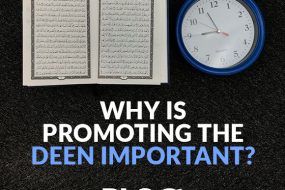
1. Fasting in Ramadan helps in achieving taqwa.
Allah says:
“O you who have believed, decreed upon you is fasting as it was decreed upon those before you that you may become righteous (achieve taqwa)” (Al-Baqarah, 2:183)
Taqwa is the aim of our existence. Allah reminds us of it in the Qur’an again and again.
“O you who have believed, fear Allah as He should be feared and do not die except as Muslims.” (‘Ali-‘Imran, 3:102)
When we change our attitude while fasting and have a good mental state, we can achieve taqwa. Jabir ibn Abullah said,
“When you fast, your hearing, your vision, and your tongue should also fast by avoiding lies and sins. You should not abuse your servant. You should maintain your composure and dignity on the day you fast. Do not make your fasting day the same as your normal day.” 1
2. Double reward of fasting:
“Whoever feeds a fasting person will have a reward like that of the fasting person, without any reduction in his reward.” 2
Ibn Taymiyah said:
What is meant by giving him iftaar is giving him enough to satisfy him. 3
From the ‘ibaadah of providing food for people stems many other acts of worship such as creating love and friendship towards those who are given the food, which is a means of entering Paradise, as the Prophet (![]() ) said:
) said:
“You will not enter Paradise until you truly believe, and you will not truly believe until you love one another.” 4
3. Reading Qur’an in Ramadan assists in attaining “taqwa”
“The month of Ramadan [is that] in which was revealed the Qur’an, a guidance for the people and clear proofs of guidance and criterion.” (Al-Baqarah, 2:185)
Reading Qur’an in this month assists in attaining “taqwa” since it is one of the main objectives of the revelation of the Qur’an. Allah says:
“[It is] an Arabic Qur’an, without any deviance that they might become righteous.” (Az-Zumar, 39:28)
4. A means of gaining Forgiveness of sins:
a. “Whoever fasts Ramadan out of faith and in the hope of reward, his previous sins will be forgiven.” 5
b. “Whoever spends the nights of Ramadan in prayer out of faith and in the hope of reward, his previous sins will be forgiven.” 6
c. “Whoever spends Laylat al-Qadr in prayer out of faith and in the hope of reward, will be forgiven his previous sins.” 7
d. “…from one Ramadan to the next are expiation for sins committed in between, so long as you avoid major sins.” 8
5. Steadfastness and Patience:
Fasting helps in developing a strong will power. Fasting is patience in obeying Allah, patience in keeping away from the things forbidden by Allah, and patience in bearing the decree of Allah, hunger, thirst, physical and mental weakness. So it combines all three types of patience, thus the fasting person deserves to be counted as one of the patient, and Allah says:
“Indeed, the patient will be given their reward without account.” (Az-Zumar, 39:10) 9
6. Seeking Laylatul Qadr:
“There has come to you Ramadan, a blessed month which Allah has enjoined you to fast, during which the gates of heaven are opened and the gates of Hell are closed, and the rebellious devils are chained up. In it there is a night which is better than a thousand months, and whoever is deprived of its goodness is indeed deprived.” 10
7. Fasting precludes ar-riya and assists in ikhlaas:
“Allah said: ‘Every deed of the son of Adam is for him except fasting; it is for Me and I shall reward for it…’” 11
Allah didn’t say “prayer is Mine”, or “Hajj is Mine”, or “charity is Mine”. Why did He single out fasting? Al-Qurtubi said: Because showing off may enter into all good deeds, but no one can see when a person is fasting except Allah, so Allah connected it to Himself. Hence Allah said in hadeeth Qudsi, “He gives up his food, his drink and his physical desires for My sake.” 12
8. Ramadan trains us to have good character and be truthful:
“Whoever does not give up false speech and acting upon it and ignorant behaviour, Allah has no need of his giving up his food and drink”. 13
So if a person refrains from disobeying Allah or gives up sinfulness, then this is true fasting. Meaning, your body needs to fast with you too along with hunger and thirst.
“…and if somebody should fight or quarrel with him, he should say, ‘I am fasting.’” 14
9. A sense of Unity:
All the Muslims participate in this act of worship. All of us are fasting and breaking the fast at the same time. We as a single ummah gather upon a single act of worship directing towards a single purpose.
10. Ramadan is an opportunity to learn discipline in food and drink:
One of the benefits of fasting is good health. This is something we should seek because with good health, we can worship Allah better and do extra good deeds which we might not be able to do if we did not have it. The Prophet (![]() ) said:
) said:
“A strong believer is better and is more lovable to Allah than a weak believer, and there is good in everyone…” 15
11. Two moments of Joy:
“The fasting person will have two moments of joy: one when he breaks his fast, and the other when he meets his Lord; then he will be pleased because of his fasting.” 16
- Musannaf Ibn Abi Shaybah ↩
- Al Tirmidhee ↩
- Al-Ikhtiyaaraat, p. 194 ↩
- Narrated by Muslim, 54 ↩
- al-Bukharee, 2014; Muslim, 760 ↩
- al-Bukharee (2008) and Muslim (174) ↩
- Narrated by al-Bukharee, 1910; Muslim, 760. ↩
- Saheeh Muslim (233) ↩
- Majaalis Shahr Ramadan, p. 13, Shaykh Ibn ‘Uthaymeen ↩
- Narrated by An-Nasa’ee, 2106; Ahmad, 8769. classed as saheeh by al-Albaani in Saheeh al-Targheeb, 999. ↩
- Al-Bukharee (1761) and Muslim (1946) ↩
- Narrated by al-Bukharee, al-Sawm, 1761 ↩
- Sahih Al-Bukharee: Vol.3, Book of Saum, Hadeeth no. 1903, pg. 84 ↩
- Sahih Al-Bukharee: Vol.3, Book of Saum, Hadeeth no. 1904, pg. 84 ↩
- Sahih Muslim 2664 ↩
- Narrated by al-Bukharee, 1771 ↩








19 replies on “Benefits of Ramadan”
Jazakum Allah Khaira 🙂
What is meant by shawwal? Is it fasting 6 days after Eid al Adha?
Shawwal is the month that immediately follows the month of Ramadan.
Eid-ul-Fitr is celebrated on the 1st of Shawwal.
Observing fast on six days of Shawwal is recommended.
Abu Ayyub al-Ansari (Allah be pleased with him) reported Allah’s Messenger (may peace be upon him) as saying: He who observed the fast of Ramadan and then followed it with six (fasts) of Shawwal. it would be as if he fasted perpetually. (Hadith#2614, Imam Muslim, translation by Abdul Hamid Siddiqui , Volume: The Book of Fasting (Kitab Al-Sawm)
This is the best lesson I haven’t ever experienced any where. It is very useful knowledge that will change those who tend to do their things with a clear purpoes.
May Allah bless you Ukhty, AMIN
Ramadan Maqbuul.
Jazakallahu bi khairi
Jazakallahu khairan.Nice one.
Thought provoking indeed! BarakAllahufeekum. May Allah help us to keep our intentions right.
THIS REALLY IS WHAT WE SHOULD IMPLEMENT IN OUR LIFE RAMADAN TEACHES US THE REAL WAY HOW WE SHOULD LEAD OUR LIFE so nice of you for awakening us by these lessons jazakmullah khair
Alhamdulillah! well explainated
Jazzaakumullahu khairan
subhana allah,alhamdulillah,allahuakbar!!!
Masha Allah
Alhamdulillah!Best guidance
Ramadan is a holy opportunity to get nearer to God. I love this very much and wait eagerly every year for Ramadan. May Allah bless us all.
Mashallah .. Really nice one ! Hope our fasts and prayers get accepted!
[…] explore and cruise through the authentic texts from the Quran and the Sunnah, we get to know what Ramadan is really about. This can help us get motivated, preventing us from spending the month in a mechanical way. Rather, […]
[…] explore and cruise through the authentic texts from the Quran and the Sunnah, we get to know what Ramadan is really about. This can help us get motivated, preventing us from spending the month in a mechanical way. Rather, […]
Mashaa Allah, May Allah (SWT) bless you all and grant you goodness, proud of you all and looking forward for more such as magnificent words to have from yours.